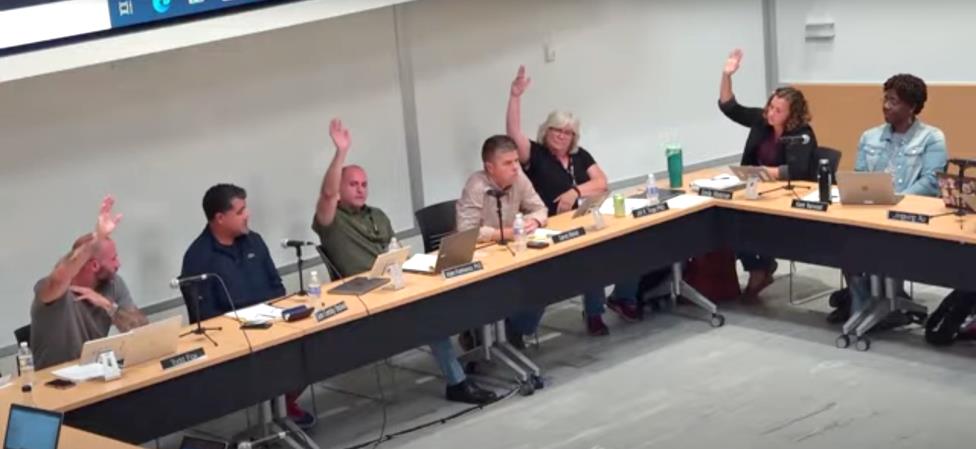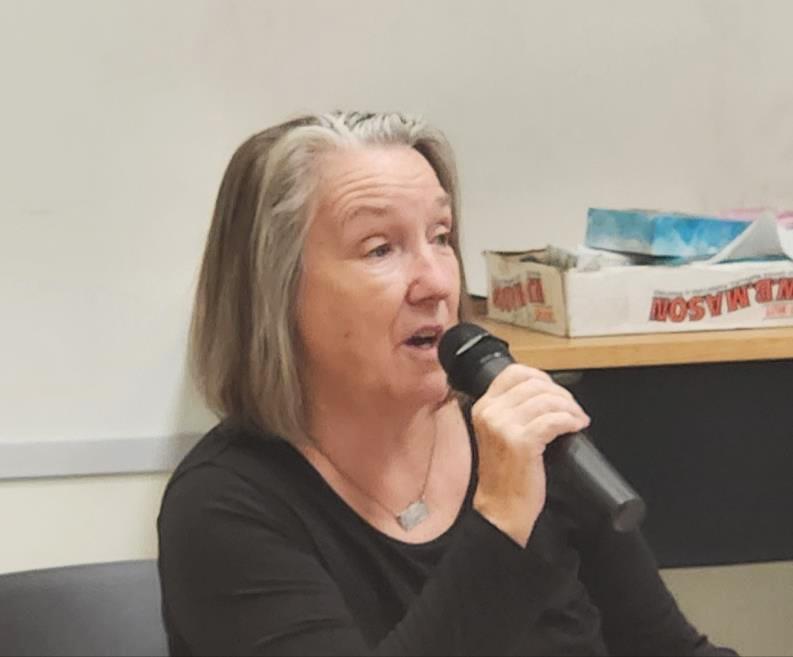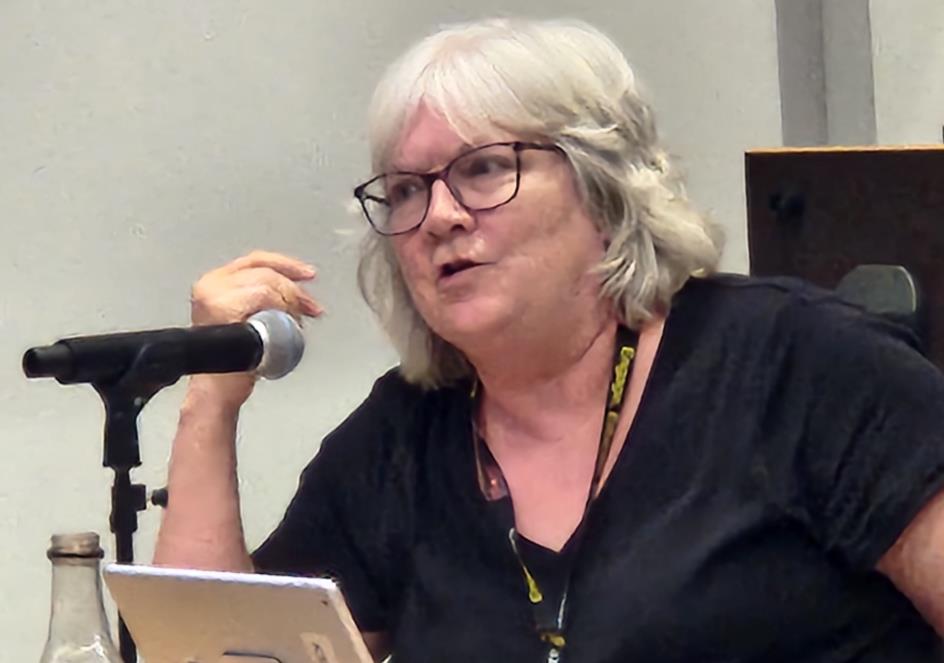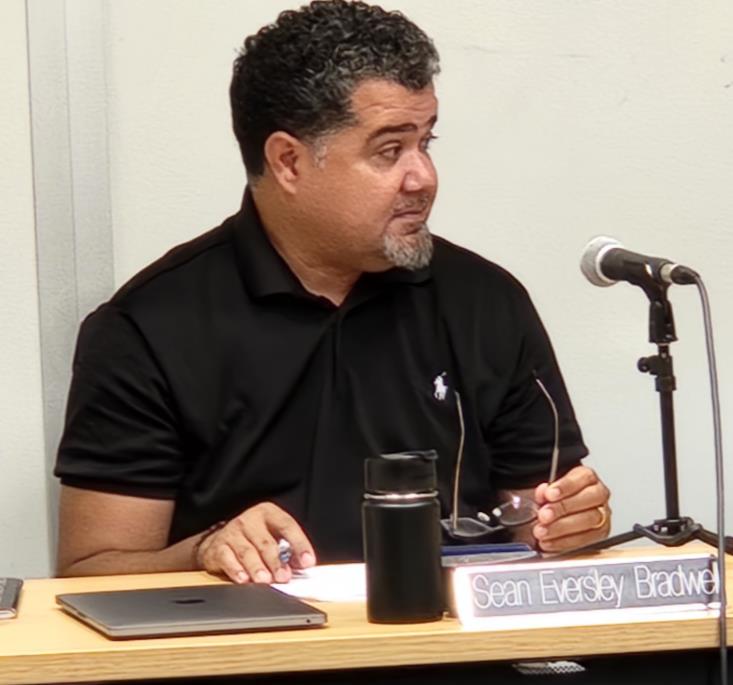Reporting and Analysis by Robert Lynch; September 14, 2024
If Moira Lang wants to return to the Ithaca Board of Education, she’ll have to fight to do so. She won’t get there by coronation. And even if Lang were to apply for a vacancy appointment—assuming the board chooses to make one—there’s no assurance a majority of board members would value her resume.

Last Tuesday, September 10th, Ithaca’s Board of Education—one member short—split four-four on whether to fill a suddenly-occurring vacancy by reaching down to the first runner-up in last May’s seven-way school board race. Moira Lang, a nine-year Board incumbent, was that fourth-place finisher. And without a fifth vote to invite her to rejoin, the board kept her from ascending to the seat vacated last month by Katie Apker. The Apker seat remains vacant. It may stay that way through next spring.
“It seems a bit personal. Is it personal? Or is it to fill a seat?” Karen Yearwood, one of Lang’s strongest allies, asked colleagues, clearly rhetorically. Her question came during a discussion that moved to a vote quicker than some might have expected. It all was over within 15 minutes.
Resistance to Lang’s elevation may not have been personal. But it was political. And the divisions became evident to anyone who’s followed Ithaca City School District (ICSD) politics this past year. Moira Lang was not just some vanilla, back-bench board member. And these are not normal times for the Ithaca City School District.
Lang, who’d held a seat on the ICSD Board since 2015, and who’d risen to Board Vice-President by last year, was a vocal defender of a nearly $169 Million school district budget that more than 70 per cent of ICSD voters rejected at the polls last May. When they voted down the budget, they also removed from office two long-time Board incumbents, Moira Lang one of them.

Newcomers Emily Workman and Todd Fox assumed the seats the incumbents surrendered. The only sitting member reelected, Adam Krantweiss, had only served on the board for one year. If you’re looking for a term, call Fox, Workman and Krantweiss the “Young Turks” of ICSD governance. (Their age doesn’t matter.) Moira Lang, by contrast, reflected the past; the voter-rejected past.
The budget that Lang defended was a budget most voters found unduly bloated. Todd Fox actively campaigned against the spending package. Workman told a reporter she was unsure about it. Quite clearly, many who voted last spring took Fox’s and Workman’s hesitancy into account.
“I don’t think as a Board we have the right to circumvent the democratic process,” Todd Fox said last Tuesday as he countered Yearwood’s strong advocacy of Lang’s appointment. “There’s some people that might have voted one way previously, and they’d vote differently in the future, and I don’t think that we have the right to take that process away.”
Todd Fox wasn’t the only one to argue that you can’t transpose a past election into a new, hypothetical one. Had four board seats—and not just three—been in play last spring, rankings may have come out differently. And just as importantly, more candidates may have run for them.
“We had a community election, and that person (Lang) in this particular election did not get enough votes by the community to make it onto the board,” Adam Krantweiss said, his opinion reflecting Fox’s skepticism about giving first runner-up status any weight. “I think that we should not necessarily be appointing somebody that doesn’t have the approval of enough community members to make it across the finish line.”
“If the community had been told that they had four board seats to fill, I do not necessarily believe that it would have been the same four people that were listed as the four highest vote-getters,” the quiet-voiced Workman stated. “So there’s really no way to go back in time to know whether that person still would have received the fourth highest votes.”

Never once in all the board discussions that night was Moira Lang’s name mentioned. It could have been. But board members appeared to think it impolite to do so. It was as though the person of whom they spoke had no identity and carried no legacy.
“I actually haven’t received one message that just said we want it to be the fourth vote-getter, no matter who it is,” Workman said, infusing a dose of reality. “Every single message, every conversation that I’ve heard among board colleagues has been specifically personal about a specific person that they are advocating for to take the seat.”
And one can see why they would. Just like in Congress or the Supreme Court, school board majorities matter. If you want to call them “progressives,” or advocates for “expansive educational exceptionalism,” Lang allied herself with those who place high-quality education above cut-corners thrift. School Superintendent Dr. Luvelle Brown comes from that camp. So, too, based on their past voting, do Board President Sean Eversley Bradwell, Karen Yearwood, and their fellow Board members Erin Croyle and Garrick Blalock.
Krantweiss, along with cost-conscious Board member Jill Tripp—who remained silent during Tuesday’s debate—have taken a more frugal approach of late. Count noses. Eversley Bradwell, Yearwood, Croyle and Blalock could easily form a voting bloc of four. Tripp, Krantweiss, Fox and Workman could vote the other way. Whoever fills the Apker seat could break deadlocks and ties. No doubt, that’s why some resisted a Moira Lang coronation.
True, educational decisions are often made by independence, tempered by nuance. One cannot always expect four-four ties this coming school year. Rather, it’s the attitudinal adjustment that matters here. The spend-what-we-must culture that dominated so much of what the Ithaca City School District has been for so many years was arguably muscled aside—or at least, jostled a bit— by the stunning budget defeat of last May. It’s the “old way of thinking” versus the new.
Erin Croyle doesn’t like what she hears and feels. “If we want to get into that sort of treachery, we can,” Croyle said of the political feud she’s sensed building around a Lang appointment. “But the fact is this person got the fourth most votes; the seat is empty; we need a board member; it’s a lot of work; and this person proved their worth time and time again.”
“If one person—and there’s weird allyships because one person is going to change the whole board, that is so ridiculous,” Croyle insisted. “I’ve never seen it function like that, and there’s not devious things going on here. We just want a full board so we can have a quorum; so we can keep business moving.”

Erin Croyle may not like what she sees, but she “gets it.” The Ithaca school community is divided, not just over spending, but also over the kind of perceived negligence that’s found both of the ICSD’s middle schools, as well as Enfield and Beverly J. Martin Elementary Schools cited by New York State for poor academic performance. Considering the salaries and taxes ICSD residents pay, taxpayers find that kind of failure inexcusable.
As a result, some elected school board members don’t want to find themselves on the wrong side of the argument.
Once they deadlocked Tuesday on filling the Apker appointment with that person they dared not name, the board offered no “Plan B” alternative. They moved on to other business. Whether they’ll revisit the vacancy at future sessions remains unknown. Given the comments of Krantweiss and Fox, keeping the seat unfilled until next year’s elections remains a strong possibility.
No stomach exists for a special election, as the Board President has said it could cost $35-40,000. The only remaining alternative to a continued vacancy would be to invite applications and vet candidates as though in a job interview.
“Some boards have done it by an interview process,” Eversley Bradwell advised fellow board members on meeting night. “I would dare say let me know what time you have to make that take place,” implying the time they’d have is no time at all.
And still, how would one pick an Apker successor without getting into the same philosophical morass that torpedoed the Lang reengagement?
Board President Eversley Bradwell insists that the workload demands a ninth board member. And to him, Moira Lang was the logical choice.
“For me, it was a process, not a person,” Eversley Bradwell said. “If the fourth person said no, then we would go to the fifth person. Those are the people who put their names forward; that did the work to be on the ballot.”
Sean Eversley Bradwell said something else.
“I challenge the idea that it is not a democratic process,” the Board President said, countering the positions of Fox, Krantweiss and Workman. State education law, he stressed, grants school boards the power to fill board vacancies. All continuing board members were “democratically elected,” he said. “It can’t get much more democratic than that,” the Board President reasoned. And “it couldn’t be any more democratic than going to the election results and figuring out who was next in line.”
The argument may sound good on its surface. But its conclusion is inapt under the circumstances.

Just because New York Education Law permits school boards to fill vacancies, it does not mandate that they must do so. And what’s at stake here is a politically-charged appointment, not a garden-variety one.
“There’s a lot to be done, and a lot of work to be divvied out,” Karen Yearwood said in support of filling the Apker seat. “So it would be good to get someone with experience that we’ve seen, and which was also endorsed by one of our unions.” (The Ithaca Teachers Association had endorsed Lang.)
At least for public consumption, Sean Eversley Bradwell would view the Apker vacancy-fill in the abstract. Emily Workman, on the other hand, sees it in real world terms, recognizing there’s a person behind the process.
Moira Lang has never publicly stated her commitment to rejoin the Board of Education. But she’s said nothing to dispel that interest, either. Board members talk. Phone calls get made. Quite probably, Lang had informed those like Yearwood and Croyle that if offered appointment, she’d accept it. And also quite likely, had Tuesday’s resolution passed, there’d never have been a need to reach down to the fifth-place finisher, Barry Derfel.
“I don’t appreciate the insinuation that there is any personal motive in this,” Emily Workman criticized unnamed others at her board table. “It’s wanting to be responsive to a democratic process and the electorate being able to make the decisions about who sits on this board.”
Those with long memories may draw parallels between Tuesday’s debate and what happened in the Town of Enfield just over three years ago. That was when its Town Board appointed a former Councilperson as Supervisor rather than holding the seat open until the next General Election.
History can easily repeat itself. The Enfield appointment tore the town apart for a while. Maybe it’s best that the Ithaca Board of Education not commit Enfield’s mistake, should that mistake have ever been made. An empty seat at the board table is just that… empty. Keeping it empty may also in the process keep peace.
###

